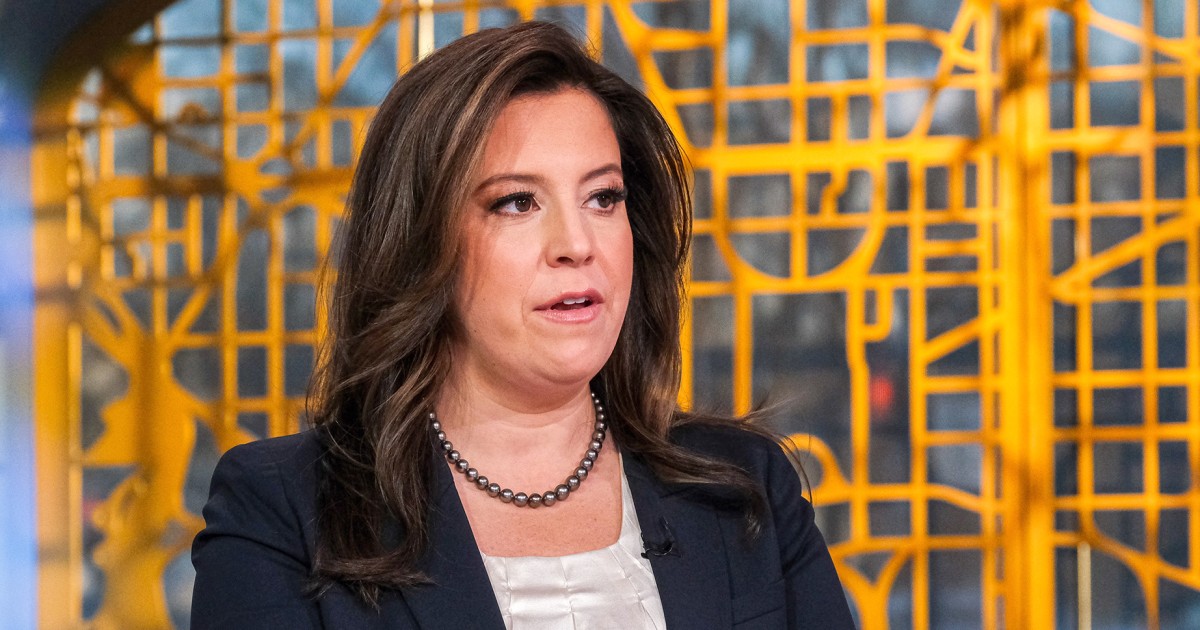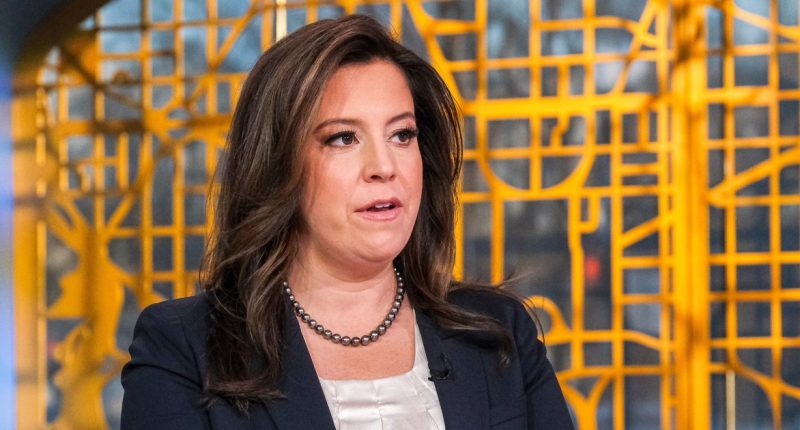
WASHINGTON — In recent days, former President Donald Trump and one of his top allies, Rep. Elise Stefanik, have referred to the federal criminal defendants incarcerated in connection with the Jan. 6 attack on the U.S. Capitol as “hostages,” a comparison equating the American judicial system with terrorist and militant organizations.
Some relatives of hostages taken during the Oct. 7 Hamas attack on Israel told NBC News they were offended by the comparison.
The reality is that most of the alleged rioters, particularly those charged with misdemeanors like parading through the Capitol, have been released pending trial. The overwhelming majority of those incarcerated have either pleaded guilty to crimes or been found guilty by juries. Others were ordered held pretrial because they present a threat to the public, violated pre-trial conditions or are considered a flight risk.
“They ought to release the J6 hostages. They’ve suffered,” Trump said over the weekend. “I call them hostages. Some people call them prisoners. I call them hostages. Release the J6 hostages, Joe. Release them Joe. You can do it real easy, Joe”
Stefanik, who has served as the No. 4 member of House GOP leadership since then-Rep. Liz Cheney was ousted from the position for criticizing Trump’s actions in connection with the Jan. 6 attack, echoed Trump’s words on “Meet the Press” Sunday. “I have concerns about the treatment of Jan. 6 hostages,” she said.
Stefanik’s office did not respond to a request for comment to specify which Jan. 6 criminal defendants she believes are being held as “hostages.”
In a speech three years ago, on Jan. 6, 2021, Stefanik, R-N.Y., said rioters should be prosecuted “to the fullest extent of the law.”
Some relatives of those taken hostage in Israel by Hamas told NBC News they were upset that Trump would use the term to refer to criminal defendants in the American court system, especially when more than 130 actual hostages remain in captivity in Gaza. Some of the released hostages have spoken out about deprivation of food and physical abuse while held in captivity by Hamas, a U.S.-designated terror organization, and its supporters in Gaza. Family members of hostages said they didn’t want their continued fight for the return of their loved ones to be politicized.
In contrast to the civilians abducted by terrorists overseas, every single Jan. 6 rioter currently being held behind bars is there either because they were found or pleaded guilty, or because a federal judge — after hearing evidence from both prosecutors and the defendants — ordered them held pretrial due to the specific circumstances of their case. Even then, pretrial detainees have the opportunity to have their cases examined by a panel of federal appeals court judges, which several Jan. 6 defendants have done.
Federal judges who have held Capitol riots defendants in custody pending trial or have sentenced convicted defendants to prison were appointed by presidents of both parties and confirmed by the Senate. Over the three years of the investigation, it has become less and less common for new Jan. 6 arrestees to be ordered held until trial, particularly if they hadn’t committed new crimes over the intervening years since the Capitol attack. The exceptions have been in cases with extreme circumstances, such as the case of a Jan. 6 defendant who went on the run when the FBI showed up to his home in November.
Since the attack, more than 700 supporters of the former president have appeared before a judge, sworn an oath and admitted that they engaged in criminal conduct on Jan. 6. Many committed only small criminal offenses and were sentenced to probationary sentences without any time behind bars, or to short terms of incarceration. Others, like MAGA hatted rioter Daniel “D.J.” Rodriguez — who drove a stun gun into the neck of former Metropolitan Police officer Michael Fanone after he was abducted by the mob near the lower west tunnel — have been sentenced to significant periods in prison.
Only a small fraction of Jan. 6 defendants have been ordered held pretrial. They include men like Oath Keepers founder Stewart Rhodes and former Proud Boys chairman Enrique Tarrio, who were subsequently convicted of seditious conspiracy along with members of their respective organizations. Tarrio received the longest Jan. 6 sentence to date, 22 years in prison.
The evidence against pretrial detainees is typically substantial, and rioters get credit for time served when they are eventually sentenced. Jonathan Mellis, who had been held in pretrial detention, pleaded guilty over the summer and was sentenced in December to 51 months in federal prison. He repeatedly struck law enforcement officers, according to prosecutors and video evidence, with a large wooden stick, aiming for their necks.
“We’re banging on the goddamn doors, is what we’re doing,” Mellis said in a video he posted on social media. “Storming the f—ing castle!”
Another defendant who was held pretrial was Brandon Fellows; he was held for more than two years before he was convicted at trial in August. Representing himself, he told jurors he was “very comfy” in a senator’s chair after he stormed the Capitol on the “beautiful day” of Jan. 6.
“We had to take the election back. It was stolen,” Fellows said, telling jurors he enjoyed the fact that members of Congress were scared for their lives. “We had the right to overthrow it.”
Fellows had been released after his 2021 arrest but was ordered held by Judge Trevor McFadden, a Trump appointee, for violating his pretrial release conditions.
“I can no longer give the defendant the benefit of the doubt,” McFadden, who is known for sentencing Jan. 6 defendants to lower periods of incarceration than other judges handling Capitol cases, said at a hearing in 2021. “I’ve tried, but we are where we are.”
“I gave you a chance,” McFadden told Fellows at a subsequent hearing. “You’ve had chance after chance.”
Source: | This article originally belongs to Nbcnews.com









